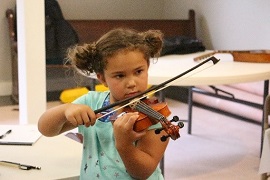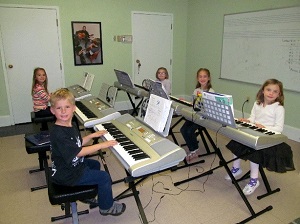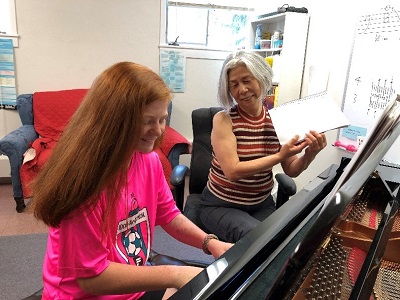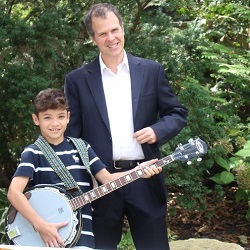School’s out! That exclamation brings extra excitement for a fun and relaxing summer. But, of course, that means a “real” back to school is just around the corner! So now is the time to consider your child’s activities and equipment for the fall docket. Learning a new musical instrument is a great way to kick off the new school year.
Let’s revisit why music is so beneficial to children and their overall development.
Playing a musical instrument promotes good listening and focus, which can help strengthen study skills. It boosts self-esteem and encourages self-expression. Learning music teaches essential life skills such as commitment, dedication, perseverance, and resilience.
Dr. Nina Kraus, a professor of communication sciences, neurobiology, and physiology, and the director of the Auditory Neuroscience Laboratory at Northwestern University, states, “The same biological ingredients that are important for reading are those that are strengthened through playing a musical instrument.” She goes on to say, “The ability to categorize sounds, to pull out important sounds from background noise, to respond consistently to the sounds in one’s environment…. these are all important ingredients for learning, for auditory learning, for reading, (and) for listening in the classrooms.”
Learning the right musical instrument is the gateway to a lifetime of musical fun and enrichment.
But how to choose?
Making the decision is a team effort involving you as the parent, your child, and the instructors. There are several factors involved in finding an instrument match, but first and foremost, it’s important to let your child be the guide.
Yes, the decision will be steered by age, physical development, maturity, and personality, but your child needs to feel excited and empowered by the decision. If they are adamant about NOT playing a particular instrument, then any amount of coaxing or bribing is unlikely to change that lack of excitement, resulting in little chance of success.
Let’s start with age.
Remember, because children develop differently with respect to age, the right instrument for one child may not be a good fit for another because of physical build or maturity. This is a case where one size does not fit all. Frustrations occur when instruments built for larger hands or stronger lungs are played by children not physically ready for them. 
Singing and music and movement classes are ideal for the very early music starters, helping to develop listening, pitch, and rhythmic and coordination skills. This is an excellent intro to learning an instrument. In addition, CCM offers Music Makers music and movement class for these first learners, who are typically four years old and younger.
The primary purpose for early learners between four and seven years old is to have fun and learn basic musicianship skills since they are limited by size and stamina. Keyboard and string instruments are a good fit for this young age group and can build a strong music foundation. 
Smaller-scale instruments such as eighth and sixteenth-size violins and cello are available to help address the issues of size, finger stretch, and weight. A quarter-size guitar is also available. CCM typically starts students around four years of age on violin, cello, and piano, and guitar at around six.
Don’t rule out drums for kids around seven and up. It can also be a good fit if the student is able to reach the pedals and cymbals.
Students nine to ten years of age can typically start handling brass instruments well, depending on lung capacity and strength. Most children manage woodwind instruments at approximately age ten, dependent on physique, maturity, and dexterity. Students with well-formed dental structures, including permanent front teeth, will do better with brass and woodwind instruments.
Although progress has been made, gender bias still exists in children and instrument selection, such as the stereotype of girls playing flute and boys bashing the drums. Historically, many instruments have been tagged as masculine or feminine. However, these typecasts are fading away. Instead, parents and educators need to encourage children to choose the instrument they are passionate about no matter what others think.
Factor in their personality.
Personality counts. If your child is outgoing and likes to be on the center stage, certain instruments lend themselves better to that such as the flute or trumpet, since these musicians tend to stand in front of a band at some point during a performance. (source: https://www.cnn.com/2013/09/09/living/parents-kids-body-type-music-instrument/index.html)

Also, do not pick an instrument for your child because you played it as a kid. Again, let your child choose the instrument most comfortable at this time. Remain positive and encouraging during their musical progress, no matter the pace. Your child’s personality and maturity will evolve, and so may the passion for a specific instrument.
“Our nurturing, creative environment puts your child first,” says Kate Yoder, Executive Director, and Founder. “We encourage you and your child to come to our open house, explore all our musical offerings, and to let your child play a key role in choosing an instrument. The CCM team is committed to helping our students develop a lifelong love for music.”
Your child’s decision in selecting a musical instrument is a genuine team effort. Remember, we as educators and you as the parent want to empower your child to make the right decision as they embark on a long and fulfilling musical journey.
Many factors come into play, but ultimately, musical passion will come from within your child. So why not let CCM help navigate this musical exploration?
Taking part in an instrument petting zoo helps—having them fiddle around on the violin, make a sound on the flute, or strum on a guitar opens their eyes to possibilities. It’s a fun afternoon that helps you and your child experience their music options.
Mark your calendar now! 
Attend the CCM Discovery Day Open House on September 11th from 1 – 3 pm, where you and your children can explore different instruments. In addition, young future musicians can take Group Keyboard and Music Makers music and movement demo classes (dates and times to be announced soon).
But why wait? Let’s talk instruments and start you or your child on their musical path today.
Back To Top